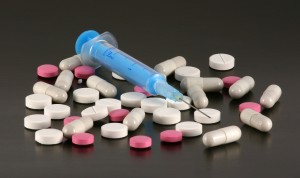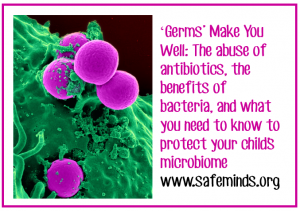By Eric Uram, Executive Director, SafeMinds
If, like me, you grew up learning “germs make you sick,” you probably think bacteria are the bad guys.
It’s bacteria (Streptococcus pyogenes), after all, that cause strep throat.
And bacteria (E. coli) that cause urinary tract infections.
And bacteria (Salmonella) that cause food poisoning.
So, bacteria, of course, is bad.
Right?
The microbial world has been getting a bad rap for years.
But we humans have actually evolved to co-exist with bacteria.
Even more than coexisting, we humans are actually walking, talking microbial communities.
Bacteria is often beneficial
The bacterial cells in our bodies outnumber skin, blood, organ and other cells at least ten to one.
It’s not just that bacteria aren’t harmful. Bacteria are actually essential to our health. Bacteria and other microorganisms play a critical role in our survival.
Our skin, mouth, airways, gastro-intestinal and urogenital tracts all have microbial populations that co-exist and provide assistance to us. The microorganisms in our bodies help us digest our food, are a vital part of our immune system, and even help us grow.
Yet because of aggressive anti-bacteria health campaigns and propaganda and the relentless marketing of antibiotics (seen a hand sanitizer commercial lately?), we are actually threatening the environmental balance by creating antibiotic resistant superbugsand harming human health.
The human gut starts to be populated with beneficial bacteria and other microorganisms during and just after birth. We get our bacteria on the way out of the birth canal from our mother’s vaginal and fecal biota. Once we’re born, we get beneficial bacteria from breast milk, human contact, and the world around us as we begin to explore it. It takes about a year for what is now called the “human microbiome” to develop into something resembling an adult’s microbiome. If any disruptions to that development occurs early in life, or potentially even before birth, it can permanently affect our health.
What constitutes a disruption to development?
Anything that kills off the bacteria in our body.
The worst culprit is, of course, antibiotics.
Antibiotics affect the body’s beneficial bacteria
 The use of antibiotics during pregnancy, early infancy, childhood, and even into adulthood can destroy the beneficial bacteria in the body, create an unsuitable habitat for good bacteria or even produce prime habitat for bad bacteria.
The use of antibiotics during pregnancy, early infancy, childhood, and even into adulthood can destroy the beneficial bacteria in the body, create an unsuitable habitat for good bacteria or even produce prime habitat for bad bacteria.
Antibiotics were first discovered in 1929 and came into widespread use in the 1940s. They were a medical miracle of sorts, a lifesaving intervention that helped people recover from once lethal bacterial infections.
But now the use and overuse of antibiotics is becoming life threatening in and of itself.
Antibiotics are a threat to both our microbiome and to the environment.
Antibiotics are now used everywhere: in treated wood, in eye ointment given to newborns, in everyday bath soaps, hand sanitizers, burn creams, and even in livestock feed on farms. In fact, over 70% of all antibiotics used are fed to healthy farm animals to enhance growth.
Antibiotic use has become a double-edged sword. Yes, they can prevent bad bugs that cause disease. But with their use we have created a class of superbugs that have evolved to resist our most powerful antibiotics.
The misuse and overuse of antibiotics has resulted in:
- Antibiotic-resistant “superbugs” like MRSA
- Leaky gut syndrome
- Microbiome depletion
- Immune system dysfunction
- Virulent yeast infections
We need to protect our children’s microbiomes in order to ensure proper development and healthy outcomes, including healthy brains.
Antibiotics used to treat prenatal infection in the mother as well as post-natal infection in infants can affect an infant’s microbiome, which in turn has potential to affect neurodevelopment.
So how do you avoid them? Here are ways to reduce your family’s exposure to antibiotics:
1) Use plain soap and water instead of hand sanitizer. It’s more effective and a lot less toxic.
2) Buy local organic antibiotic-free free-range meats and eggs, if you possibly can (these are often expensive but if you buy directly from a local farmer or join a food co-op you can get deep discounts) so you aren’t eating animals or animal products that are laden with antibiotics.
3) Remember good food is good medicine. The best way to stay healthy is to eat well.
4) Promote breastfeeding. Raw human breast milk is the best way to give your baby a healthy immune system. It’s the most powerful medicine in the world. Do everything you can to support and encourage the young moms you know to breastfeed or get donor milk if they need it.
5) If you are ill – don’t make things worse. Rest, stay nourished and drink plenty of fluids. Bacterial infections often come on top of other illnesses when you don’t properly care for yourself when you’re sick.
But wait. If your doctor prescribes an antibiotic for you or your child, what should you do?
- Talk to your doctor about your concerns: Ask her to explain why the antibiotic is really necessary.
- Educate yourself about alternatives: There are many natural ways to help the body fight disease and there are some powerful antibiotics and anti-inflammatories made in nature not a laboratory. Garlic is a particularly effective one, according to this doctor. Learn about doctor-recommended natural treatments for ear infections and other common childhood illnesses.
- Take prebiotics and probiotics if you must take an antibiotic. Probiotics will help repopulate healthy bacteria. Keeping an internal balance in one’s microbiome is essential.
- Add cultured foods like plain yogurt and kefir, as well as fermented foods like sauerkraut and kimchi to your diet, in addition to taking a probiotic supplement, to help repopulate your body with beneficial bacteria.
- Skip the sugar: Cut as far down on your sugar consumption as you can. Sugar compromises the immune system and promotes the growth of yeast, which may already be growing out of control since the beneficial bacteria isn’t there to keep them in check.
There’s an epic battle going on between good and evil. May the force be with beneficial bacteria!
Eric Uram is the Executive Director of SafeMinds, a non-profit advocacy group committed to removing harmful chemicals from the environment to protect our children’s brains.
Read more of Eric Uram’s blogs:
If I take my son fishing, will it damage his brain?
References and Further Reading:
1. Saulnier, D. M. et al. The intestinal microbiome, probiotics and prebiotics in neurogastroenterology. Gut Microbes 4:1, 1–11 (2013).
2. Taubes, Gary. Is Sugar Toxic? New York Times, April 13, 2011.
3. Wang, H., Mcentire, J. C., Zhang, L., Li, X. & Doyle, M. The transfer of antibiotic resistance from food to humans: facts, implications and future directions. OIE Rev. Sci. Tech. 31, 249–260 (2012).
4. Wang, Y. & Kasper, L. H. The role of microbiome in central nervous system disorders. Brain. Behav. Immun. 38, 1–12 (2014).
You can also learn more about the human microbiome and the role of microbes in human disease at the National Institutes of Health’s Human Microbiome Project.
Support SafeMinds and our good work.
Without your support, we cannot accomplish our goals for:
- seeking justice and accountability in the federal response to autism,
- bringing information to you, your family and friends on the science linking environmental toxins with autism,
- keeping current information on our website about the connection between autism and the environment, and
- driving the conversation around key environmental topics that promote prevention, treatment and recovery for those diagnosed with autism and related conditions.
Please give today or put us in your year-end plans for contributions.



